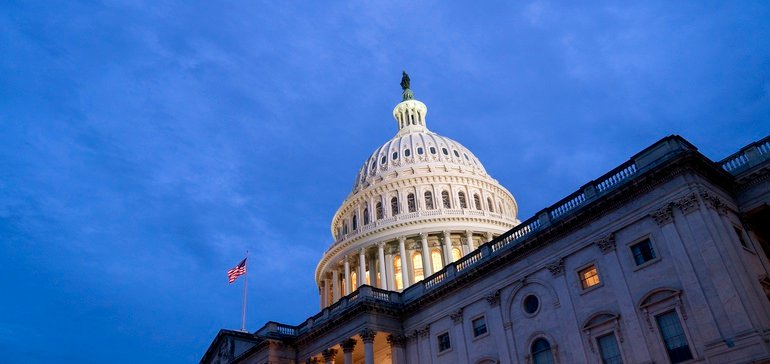SOCIAL
Are We Entering a New Phase for Social Media Regulation?


The US Government made a range of significant announcements last week which could end up having major impacts on how social media platforms operate, including potential limitations and restrictions on what digital platforms can do in regards to buying other platforms, operating their ad businesses, utilizing user data and more.
On Friday, four separate bills were introduced to the House of Representatives which all take aim at various elements of big tech monopolies.
As reported by Reuters, those four bills could potentially see:
- A law against platforms giving preference to their own products on their platforms. For example, Google would no longer be able to promote its own products in search, Apple wouldn’t be allowed to preference Apple Music over Spotify, etc.
- A restriction on business mergers in the tech sector unless the acquirer can demonstrate that the acquired company was not in competition with any product or service the platform already offers. Facebook would not have been allowed to acquire WhatsApp or Instagram under this provision.
- A ban on digital platforms owning subsidiaries that operate on their platform, if those subsidiaries compete with other businesses. This is aimed at reducing preferential behavior, and could potentially force the sell-off of certain elements.
- Improved user data portability, with platforms under legal obligation to allow users to transfer their data elsewhere if they choose, including to a competing business.
A separate bill would also give the Antitrust Division of the Department of Justice a significant boost in funding, in order to help it enforce antitrust cases, like those currently underway against both Facebook and Google.
Really, there are always antitrust cases in progress against the tech giants, and the funding increase would help to address these outstanding issues and fund further investigations.
If these bills are passed, or even if some of them make it through, that will put a new range of restrictions on how the tech giants can operate, while further investigations are also underway in Europe and other regions around potential restrictions on data sharing, due to concerns around possible misuse by foreign governments.
This also comes as the US Government continues to examine the implications of data sharing with China, which includes Chinese-owned digital platforms, and could end up impacting TikTok at some stage, as well as WeChat. While TikTok was able to avoid a ban in the US last year, after the Trump administration sought to force it into US ownership, it may still face a potential shut down in America, dependent on simmering US-China tensions.
Altogether, these elements could force major shifts in the digital marketing landscape, and it’ll be important for anyone working in the sector to take note, and prepare for changes as a result.
Though, really, these moves come as no big surprise.
Given the rise of social media, and the key role that it now plays in our everyday interactive process, it seems somewhat inevitable that, at some stage, new rules will be introduced to reign in the power of Facebook and Co., particularly as the platforms are increasingly being asked to weigh in on things like political censorship, and their networks are beings used to influence massive global shifts.
That last note may seem like an exaggeration, but with foreign-based, government-funded groups seeking to influence voter response outside their own borders via social apps, and politicians increasingly leaning on Facebook and Twitter, in particular, as a direct line to their constituents, enabling them to, among other things, cast doubt on mainstream media coverage, it’s very clear that social media is indeed causing seismic shifts in the political landscape.
If the rise of former US President Donald Trump showed us anything, it’s that social media is now the prime platform for connecting with audiences at scale, and in real-time – and with 71% of people now getting at least some of their news input from social media platforms, and rising, this is only going to become more significant.
That already has various government officials and lawmakers spooked, while the recent banning of Trump from Facebook, Twitter and YouTube also raised further concerns about political censorship, and the fact that decisions on who can and cannot have a public platform are now being made by tech CEOs in Silicon Valley. That gives private enterprise direct control over an element of politics, which, whether you agree with the Trump ban or not, is a significant issue.
Which is why Facebook has been calling for external regulation, and has even formed its own third-party regulatory group, made up of a diverse group of experts, to address such concerns. Facebook’s hope is that by showing how its independent Oversight Board can help it make such decisions, that could provide a new way forward for broader regulation, and take such decisions out of its hands.
Essentially, Facebook, and other platforms, would rather the rules not be set by their internal teams either – but within the current process, they have little choice. As such, these new bills could be a step forward, but at the same time, they would also limit Facebook’s opportunity to grow, and expand even further through acquisition.
Which, really, only means that we’ll see more Facebook clone functions, like Stories and Reels, and less attempts to buy opposing platforms, like WhatsApp and Instagram.
Would that be a better scenario? I mean, probably. Facebook’s clones have traditionally not fared as well as the originals, which leaves more room for competition in the sector.
But either way, the implications here are significant, and could spark major change across the industry. There’s a long way to go yet, but it’s worth keeping an eye on each element within this shift.
SOCIAL
Snapchat Explores New Messaging Retention Feature: A Game-Changer or Risky Move?

In a recent announcement, Snapchat revealed a groundbreaking update that challenges its traditional design ethos. The platform is experimenting with an option that allows users to defy the 24-hour auto-delete rule, a feature synonymous with Snapchat’s ephemeral messaging model.
The proposed change aims to introduce a “Never delete” option in messaging retention settings, aligning Snapchat more closely with conventional messaging apps. While this move may blur Snapchat’s distinctive selling point, Snap appears convinced of its necessity.
According to Snap, the decision stems from user feedback and a commitment to innovation based on user needs. The company aims to provide greater flexibility and control over conversations, catering to the preferences of its community.
Currently undergoing trials in select markets, the new feature empowers users to adjust retention settings on a conversation-by-conversation basis. Flexibility remains paramount, with participants able to modify settings within chats and receive in-chat notifications to ensure transparency.
Snapchat underscores that the default auto-delete feature will persist, reinforcing its design philosophy centered on ephemerality. However, with the app gaining traction as a primary messaging platform, the option offers users a means to preserve longer chat histories.
The update marks a pivotal moment for Snapchat, renowned for its disappearing message premise, especially popular among younger demographics. Retaining this focus has been pivotal to Snapchat’s identity, but the shift suggests a broader strategy aimed at diversifying its user base.
This strategy may appeal particularly to older demographics, potentially extending Snapchat’s relevance as users age. By emulating features of conventional messaging platforms, Snapchat seeks to enhance its appeal and broaden its reach.
Yet, the introduction of message retention poses questions about Snapchat’s uniqueness. While addressing user demands, the risk of diluting Snapchat’s distinctiveness looms large.
As Snapchat ventures into uncharted territory, the outcome of this experiment remains uncertain. Will message retention propel Snapchat to new heights, or will it compromise the platform’s uniqueness?
Only time will tell.
SOCIAL
Catering to specific audience boosts your business, says accountant turned coach

While it is tempting to try to appeal to a broad audience, the founder of alcohol-free coaching service Just the Tonic, Sandra Parker, believes the best thing you can do for your business is focus on your niche. Here’s how she did just that.
When running a business, reaching out to as many clients as possible can be tempting. But it also risks making your marketing “too generic,” warns Sandra Parker, the founder of Just The Tonic Coaching.
“From the very start of my business, I knew exactly who I could help and who I couldn’t,” Parker told My Biggest Lessons.
Parker struggled with alcohol dependence as a young professional. Today, her business targets high-achieving individuals who face challenges similar to those she had early in her career.
“I understand their frustrations, I understand their fears, and I understand their coping mechanisms and the stories they’re telling themselves,” Parker said. “Because of that, I’m able to market very effectively, to speak in a language that they understand, and am able to reach them.”Â
“I believe that it’s really important that you know exactly who your customer or your client is, and you target them, and you resist the temptation to make your marketing too generic to try and reach everyone,” she explained.
“If you speak specifically to your target clients, you will reach them, and I believe that’s the way that you’re going to be more successful.
Watch the video for more of Sandra Parker’s biggest lessons.
SOCIAL
Instagram Tests Live-Stream Games to Enhance Engagement

Instagram’s testing out some new options to help spice up your live-streams in the app, with some live broadcasters now able to select a game that they can play with viewers in-stream.
As you can see in these example screens, posted by Ahmed Ghanem, some creators now have the option to play either “This or That”, a question and answer prompt that you can share with your viewers, or “Trivia”, to generate more engagement within your IG live-streams.
That could be a simple way to spark more conversation and interaction, which could then lead into further engagement opportunities from your live audience.
Meta’s been exploring more ways to make live-streaming a bigger consideration for IG creators, with a view to live-streams potentially catching on with more users.
That includes the gradual expansion of its “Stars” live-stream donation program, giving more creators in more regions a means to accept donations from live-stream viewers, while back in December, Instagram also added some new options to make it easier to go live using third-party tools via desktop PCs.
Live streaming has been a major shift in China, where shopping live-streams, in particular, have led to massive opportunities for streaming platforms. They haven’t caught on in the same way in Western regions, but as TikTok and YouTube look to push live-stream adoption, there is still a chance that they will become a much bigger element in future.
Which is why IG is also trying to stay in touch, and add more ways for its creators to engage via streams. Live-stream games is another element within this, which could make this a better community-building, and potentially sales-driving option.
We’ve asked Instagram for more information on this test, and we’ll update this post if/when we hear back.
-

 MARKETING7 days ago
MARKETING7 days agoThe key to correcting the C-suite trust deficit
-

 MARKETING6 days ago
MARKETING6 days agoA Recap of Everything Marketers & Advertisers Need to Know
-

 PPC4 days ago
PPC4 days agoHow the TikTok Algorithm Works in 2024 (+9 Ways to Go Viral)
-

 MARKETING4 days ago
MARKETING4 days agoHow To Protect Your People and Brand
-

 SEARCHENGINES5 days ago
SEARCHENGINES5 days agoGoogle Started Enforcing The Site Reputation Abuse Policy
-

 SEO7 days ago
SEO7 days ago128 Top SEO Tools That Are 100% Free
-

 SEO3 days ago
SEO3 days agoHow to Use Keywords for SEO: The Complete Beginner’s Guide
-

 PPC5 days ago
PPC5 days agoHow to Craft Compelling Google Ads for eCommerce



